AUCTORES
Globalize your Research
Case Report
*Corresponding Author: Abzaliev K.B., Research Institute of Cardiology and Internal Diseases
Citation: Ormanov B.K, Abzaliev K.B, Kolesnikov A.E, Abzalieva S.A. (2023). A case of successful implantation of a modified stent graft in a dissecting aortic arch aneurysm, J. Surgical Case Reports and Images, 6(1); DOI: 10.31579/2690-1897/136
Copyright: © 2023. Abzaliev K.B. This is an open-access article distributed under the terms of The Creative Commons Attribution License, which permits unrestricted use, distribution, and reproduction in any medium, provided the original author and source are credited.
Received: 23 November 2022 | Accepted: 29 December 2022 | Published: 04 January 2023
Keywords: modified stent graft; dissecting aneurysms of the arch and thoracic aorta; fenestration; endovascular surgery
With the development of endovascular intervention methods, it became possible to save the patient in more cases. If it is not possible to install a stent graft for technical reasons or the patient is not transportable, open surgical interventions remain.
The authors described a method for treating a patient with a dissecting aneurysm of the thoracic aorta type IIIB according to DeBakey using a stent graft by forming a fenestration according to the model of the anatomy of the left subclavian artery orifice, modified by a physician "on the operating table". Such modifications on the table or in situ make it possible to model the prosthesis according to the variant of the anatomy of a particular patient, which allows optimizing the fit of the prosthesis, eliminating additional stages of complex surgical treatment, reducing the undesirable consequences of standard approaches, including preliminary endovascular occlusion of the left subclavian artery and the formation of a carotid-subclavian shunt, reduce time of stationary observation. The use of the described technique makes it possible to reduce complications in radical (open) surgical treatment of patients with dissecting aneurysms and increase the effectiveness of treatment. This technique is a promising direction in the development of endovascular and surgery and requires further study to assess long-term results and prognosis in a large number of patients.
In order to increase the radicalness of intervention for aortic aneurysms, various staged and combined techniques are used. In this case, the main problem is the optimization of the ratio of the volume of surgical intervention and the physiological reserve of the patient [1]. Open surgery was traditionally the gold standard of surgical treatment before the development of X-ray endovascular correction methods. Open surgery for this pathology is always associated with high perioperative risks and mortality. And with comorbid conditions or concomitant diseases and with complex anatomical features, the risk of open surgery increases significantly, and specialists understand this.
A much more complex aortic lesion, consisting of aneurysm and aortic dissection involving the aortic arch, presents a technical challenge for remodeling due to involvement of the left subclavian artery. With the development of endovascular methods, options for endovascular treatment of complex pathology of the aorta involving the arch are being developed. A promising approach is the use of fenestrated or branched endovascular aortic plasty (F/B-EVAR.
There are severe lesions of the aorta, in which it is difficult or impossible and generally contraindicated to install factory-made stent grafts. This is possible only in the case when endovascular plasty with a prosthesis can be personalized intraoperatively modified. For this procedure, the operating surgeon modifies the endovascular graft during the intervention by creating additional fenestrations according to the patient's anatomy. Numerous reports have been published demonstrating that this procedure can be performed with high technical success and acceptable perioperative and mid-term outcomes in high-risk patients [2,3,4]. We demonstrate our clinical case, which shows high success, the skill of the surgeon and is applicable in practice.
Case report No.1
Patient N. Male, 80 years old, underwent a routine examination at the place of residence in November 2019, and where an increase in the contours of the aortic arch was accidentally detected on a chest x-ray. The patient was examined by an angiosurgeon at the place of residence and received recommendations for optimal drug therapy, followed up until 2221. In May 2021, he began to notice the appearance of blood streaks in the sputum when coughing, in connection with which he consulted an angiosurgeon, who sent him for CT angiography with contrast. (Fig.1.)
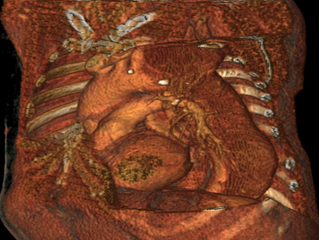
Figure. 1 Aneurysm of the descending aorta with wall dissection, type IIIb according to DeBakey.
The examination revealed a picture of a fusiform aneurysm of the descending aorta with dissection of the walls in the transversely descending and distal sections, type IIIb according to DeBakey. After that, he was referred to an X-ray surgeon, who recommended the installation of a stand-graft in stationary conditions. After a standard examination and identification of the causes of contraindications (chronic renal failure, the degree of ischemic coronary heart disease, the degree of arterial hypertension, gastric ulcer, diabetes mellitus, etc.), he was hospitalized. Patient: height 158 cm, weight 56 kg, BMI 22.3. An experienced smoker, registered with a cardiologist since 2007 for coronary heart disease, arterial hypertension with an increase in pressure up to 170/110 mm Hg, periodically adhered to antihypertensive therapy.
07.12.2021 after discussing the tactics and strategy of treatment, the patient underwent endovascular implantation of a fenestrated stent graft “on the table” into the descending thoracic aorta.
After spinal anesthesia, placement of a central catheter into the jugular vein on the right, and preparation of the surgical field of the upper third of the left thigh in the groin area, a skin and subcutaneous fat incision was made in the projection of the common femoral arteries. After opening the femoral fascia, blunt and sharp access was made to the common femoral artery (BOA) on the left. Then a standard thoracic aortography was performed, which revealed an aneurysm of the descending thoracic aorta. (Fig.2.)
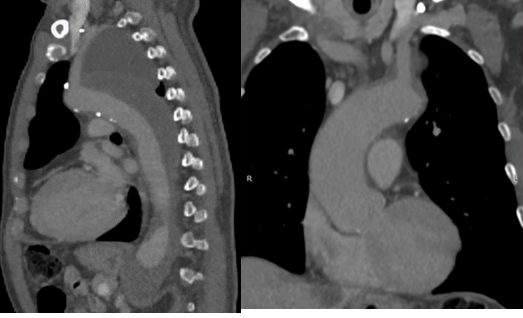
Figure 2. Aneurysm of the descending thoracic aortaThe stent-graft was removed by 1/4 of the length of the delivery catheter, in the projection of the landing zone at the orifices of the internal carotid artery (ICA) and the left subclavian artery (LAS), the proximal end of the stent-graft was fenestrated in the form of a wedge "on the table". Next, the selected CFA is pierced on the left. On a diagnostic catheter, a superrigid guidewire was introduced into the aortic arch and its distal end was placed in the ascending aorta. The catheter was removed and a partial arteriotomy was performed. After expanding the vascular access through a superrigid guidewire, a modified thoracic stent-graft Valiant Thoracic StentGraft 36.0x36x200.0 mm (No.……series…production….) was delivered to the aortic arch, mounted on a Captivia delivery system (company?).
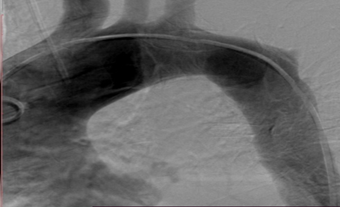
Figure.3. Angiography for stent graft sizing
Then, under the control of angiography (Fig. 3.) and fluoroscopy, the stent-graft was placed in the descending thoracic aorta, capturing the area of the dissecting aortic defect, proximal to the celiac trunk. After the stent-graft was exposed, the “crown” of the proximal apparatus was opened immediately after the brachiocephalic trunk originated so that the fenestrated zone was at the border of the origin of the left common carotid artery and the orifice of the left subclavian artery. (Fig. 4.) During intermediate angiography, the crown of the stent graft was fully opened, the arteries of the aortic arch were patent.
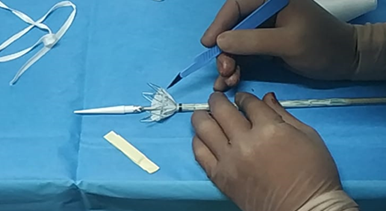
Figure 4. Fenestration of the zone where the left common carotid artery and the mouth of the left subclavian artery will be located
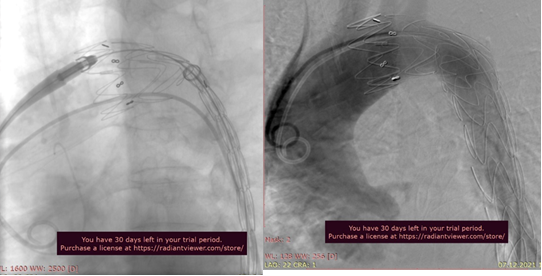
Figure 5. Stent graft fully deployed and implanted
The stent graft is fully deployed and implanted (at what pressure and for how many seconds, once or repeatedly?) (Fig. 5.) The delivery system is removed. During the control aortography, the stent graft and arteries of the aortic arch were completely patent, the false lumen was not contrasted. The CFA defect on the left was sutured with interrupted vascular sutures with a 6/0 Prolene suture. Hemostasis achieved. The wound was sutured in layers, drainage was installed, and an aseptic dressing was applied. The CFA introducer is on the right, the puncture site is removed, closed with the Angioseal 6F apparatus, an aseptic dressing is applied.
The patient was transferred to the intensive care unit for follow-up.
According to the European Society of Angiosurgeons of 2017, thoracic aortic arthroplasty (TEVAR) is not only considered an effective treatment for aneurysms of the arch and abdominal aorta, but is also recommended for use. According to the literature, the use of fenestrated or branched stent grafts showed the best clinical results in senile patients with comorbid pathology. The technique of "stent-graft fenestration" during surgery in the treatment of thoracic aortic aneurysms with dissection of the arch and abdominal aorta to bypass the visceral branches of the aorta is innovative and presents a certain risk. Subsequently, such technologies were tested with different manufacturers of stent grafts and different models.
This technique allows TEVAR to be carried out simultaneously without the development of undesirable consequences. Although today a technique using a special catheter with a puncture needle at the end is recognized as a safe technique for performing fenestration. This technique is aimed at maintaining blood supply to the left common carotid and subclavian arteries after the installation of a stent in the aortic arch, and makes it possible not to perform open bypass surgery in the future. Although such a tactic and strategy is also justified in high-risk comorbid patients, especially in situations where the administration of a contrast agent is limited. In situations where it is impossible to perform TEVAR, hybrid treatment remains the operation of choice in practice.
In our case, intraoperative fenestration "on the table" in the form of a stent-graft wedge allowed maintaining the patency of the LSA without forced occlusion with a plug and the formation of subsequent ischemia of the left upper limb with symptoms of Still's syndrome from the vertebral artery with inevitable neurological deficit. In the control study on MSCT, the modified stent graft was well positioned and there were no deformities. (Figure 6.)
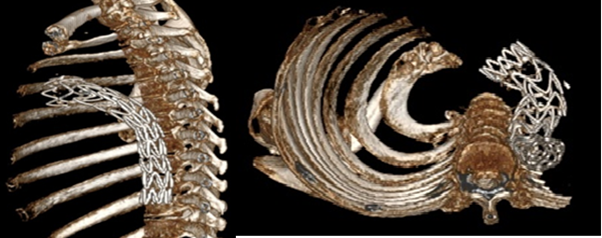
Figure 6. Implanted modified stent graft is well placed
Such modifications on the table or in situ make it possible to model the prosthesis according to the variant of the anatomy of a particular patient, which allows optimizing the fit of the prosthesis, eliminating additional stages of complex surgical treatment, and reducing the undesirable consequences of standard approaches, including preliminary endovascular occlusion of the left subclavian artery and/or the formation of a carotid-subclavian shunt. , reduce the time of stationary observation. The use of the described technique will reduce the radicalness of surgical treatment of patients with dissecting aneurysms and increase economic efficiency. This technique is a promising direction in the development of endovascular surgery and requires further study to assess long-term results and prognosis in a large sample of patients.
Clearly Auctoresonline and particularly Psychology and Mental Health Care Journal is dedicated to improving health care services for individuals and populations. The editorial boards' ability to efficiently recognize and share the global importance of health literacy with a variety of stakeholders. Auctoresonline publishing platform can be used to facilitate of optimal client-based services and should be added to health care professionals' repertoire of evidence-based health care resources.

Journal of Clinical Cardiology and Cardiovascular Intervention The submission and review process was adequate. However I think that the publication total value should have been enlightened in early fases. Thank you for all.

Journal of Women Health Care and Issues By the present mail, I want to say thank to you and tour colleagues for facilitating my published article. Specially thank you for the peer review process, support from the editorial office. I appreciate positively the quality of your journal.
Journal of Clinical Research and Reports I would be very delighted to submit my testimonial regarding the reviewer board and the editorial office. The reviewer board were accurate and helpful regarding any modifications for my manuscript. And the editorial office were very helpful and supportive in contacting and monitoring with any update and offering help. It was my pleasure to contribute with your promising Journal and I am looking forward for more collaboration.

We would like to thank the Journal of Thoracic Disease and Cardiothoracic Surgery because of the services they provided us for our articles. The peer-review process was done in a very excellent time manner, and the opinions of the reviewers helped us to improve our manuscript further. The editorial office had an outstanding correspondence with us and guided us in many ways. During a hard time of the pandemic that is affecting every one of us tremendously, the editorial office helped us make everything easier for publishing scientific work. Hope for a more scientific relationship with your Journal.

The peer-review process which consisted high quality queries on the paper. I did answer six reviewers’ questions and comments before the paper was accepted. The support from the editorial office is excellent.

Journal of Neuroscience and Neurological Surgery. I had the experience of publishing a research article recently. The whole process was simple from submission to publication. The reviewers made specific and valuable recommendations and corrections that improved the quality of my publication. I strongly recommend this Journal.

Dr. Katarzyna Byczkowska My testimonial covering: "The peer review process is quick and effective. The support from the editorial office is very professional and friendly. Quality of the Clinical Cardiology and Cardiovascular Interventions is scientific and publishes ground-breaking research on cardiology that is useful for other professionals in the field.

Thank you most sincerely, with regard to the support you have given in relation to the reviewing process and the processing of my article entitled "Large Cell Neuroendocrine Carcinoma of The Prostate Gland: A Review and Update" for publication in your esteemed Journal, Journal of Cancer Research and Cellular Therapeutics". The editorial team has been very supportive.

Testimony of Journal of Clinical Otorhinolaryngology: work with your Reviews has been a educational and constructive experience. The editorial office were very helpful and supportive. It was a pleasure to contribute to your Journal.

Dr. Bernard Terkimbi Utoo, I am happy to publish my scientific work in Journal of Women Health Care and Issues (JWHCI). The manuscript submission was seamless and peer review process was top notch. I was amazed that 4 reviewers worked on the manuscript which made it a highly technical, standard and excellent quality paper. I appreciate the format and consideration for the APC as well as the speed of publication. It is my pleasure to continue with this scientific relationship with the esteem JWHCI.

This is an acknowledgment for peer reviewers, editorial board of Journal of Clinical Research and Reports. They show a lot of consideration for us as publishers for our research article “Evaluation of the different factors associated with side effects of COVID-19 vaccination on medical students, Mutah university, Al-Karak, Jordan”, in a very professional and easy way. This journal is one of outstanding medical journal.
Dear Hao Jiang, to Journal of Nutrition and Food Processing We greatly appreciate the efficient, professional and rapid processing of our paper by your team. If there is anything else we should do, please do not hesitate to let us know. On behalf of my co-authors, we would like to express our great appreciation to editor and reviewers.

As an author who has recently published in the journal "Brain and Neurological Disorders". I am delighted to provide a testimonial on the peer review process, editorial office support, and the overall quality of the journal. The peer review process at Brain and Neurological Disorders is rigorous and meticulous, ensuring that only high-quality, evidence-based research is published. The reviewers are experts in their fields, and their comments and suggestions were constructive and helped improve the quality of my manuscript. The review process was timely and efficient, with clear communication from the editorial office at each stage. The support from the editorial office was exceptional throughout the entire process. The editorial staff was responsive, professional, and always willing to help. They provided valuable guidance on formatting, structure, and ethical considerations, making the submission process seamless. Moreover, they kept me informed about the status of my manuscript and provided timely updates, which made the process less stressful. The journal Brain and Neurological Disorders is of the highest quality, with a strong focus on publishing cutting-edge research in the field of neurology. The articles published in this journal are well-researched, rigorously peer-reviewed, and written by experts in the field. The journal maintains high standards, ensuring that readers are provided with the most up-to-date and reliable information on brain and neurological disorders. In conclusion, I had a wonderful experience publishing in Brain and Neurological Disorders. The peer review process was thorough, the editorial office provided exceptional support, and the journal's quality is second to none. I would highly recommend this journal to any researcher working in the field of neurology and brain disorders.

Dear Agrippa Hilda, Journal of Neuroscience and Neurological Surgery, Editorial Coordinator, I trust this message finds you well. I want to extend my appreciation for considering my article for publication in your esteemed journal. I am pleased to provide a testimonial regarding the peer review process and the support received from your editorial office. The peer review process for my paper was carried out in a highly professional and thorough manner. The feedback and comments provided by the authors were constructive and very useful in improving the quality of the manuscript. This rigorous assessment process undoubtedly contributes to the high standards maintained by your journal.

International Journal of Clinical Case Reports and Reviews. I strongly recommend to consider submitting your work to this high-quality journal. The support and availability of the Editorial staff is outstanding and the review process was both efficient and rigorous.

Thank you very much for publishing my Research Article titled “Comparing Treatment Outcome Of Allergic Rhinitis Patients After Using Fluticasone Nasal Spray And Nasal Douching" in the Journal of Clinical Otorhinolaryngology. As Medical Professionals we are immensely benefited from study of various informative Articles and Papers published in this high quality Journal. I look forward to enriching my knowledge by regular study of the Journal and contribute my future work in the field of ENT through the Journal for use by the medical fraternity. The support from the Editorial office was excellent and very prompt. I also welcome the comments received from the readers of my Research Article.

Dear Erica Kelsey, Editorial Coordinator of Cancer Research and Cellular Therapeutics Our team is very satisfied with the processing of our paper by your journal. That was fast, efficient, rigorous, but without unnecessary complications. We appreciated the very short time between the submission of the paper and its publication on line on your site.

I am very glad to say that the peer review process is very successful and fast and support from the Editorial Office. Therefore, I would like to continue our scientific relationship for a long time. And I especially thank you for your kindly attention towards my article. Have a good day!

"We recently published an article entitled “Influence of beta-Cyclodextrins upon the Degradation of Carbofuran Derivatives under Alkaline Conditions" in the Journal of “Pesticides and Biofertilizers” to show that the cyclodextrins protect the carbamates increasing their half-life time in the presence of basic conditions This will be very helpful to understand carbofuran behaviour in the analytical, agro-environmental and food areas. We greatly appreciated the interaction with the editor and the editorial team; we were particularly well accompanied during the course of the revision process, since all various steps towards publication were short and without delay".

I would like to express my gratitude towards you process of article review and submission. I found this to be very fair and expedient. Your follow up has been excellent. I have many publications in national and international journal and your process has been one of the best so far. Keep up the great work.

We are grateful for this opportunity to provide a glowing recommendation to the Journal of Psychiatry and Psychotherapy. We found that the editorial team were very supportive, helpful, kept us abreast of timelines and over all very professional in nature. The peer review process was rigorous, efficient and constructive that really enhanced our article submission. The experience with this journal remains one of our best ever and we look forward to providing future submissions in the near future.

I am very pleased to serve as EBM of the journal, I hope many years of my experience in stem cells can help the journal from one way or another. As we know, stem cells hold great potential for regenerative medicine, which are mostly used to promote the repair response of diseased, dysfunctional or injured tissue using stem cells or their derivatives. I think Stem Cell Research and Therapeutics International is a great platform to publish and share the understanding towards the biology and translational or clinical application of stem cells.

I would like to give my testimony in the support I have got by the peer review process and to support the editorial office where they were of asset to support young author like me to be encouraged to publish their work in your respected journal and globalize and share knowledge across the globe. I really give my great gratitude to your journal and the peer review including the editorial office.

I am delighted to publish our manuscript entitled "A Perspective on Cocaine Induced Stroke - Its Mechanisms and Management" in the Journal of Neuroscience and Neurological Surgery. The peer review process, support from the editorial office, and quality of the journal are excellent. The manuscripts published are of high quality and of excellent scientific value. I recommend this journal very much to colleagues.

Dr.Tania Muñoz, My experience as researcher and author of a review article in The Journal Clinical Cardiology and Interventions has been very enriching and stimulating. The editorial team is excellent, performs its work with absolute responsibility and delivery. They are proactive, dynamic and receptive to all proposals. Supporting at all times the vast universe of authors who choose them as an option for publication. The team of review specialists, members of the editorial board, are brilliant professionals, with remarkable performance in medical research and scientific methodology. Together they form a frontline team that consolidates the JCCI as a magnificent option for the publication and review of high-level medical articles and broad collective interest. I am honored to be able to share my review article and open to receive all your comments.

“The peer review process of JPMHC is quick and effective. Authors are benefited by good and professional reviewers with huge experience in the field of psychology and mental health. The support from the editorial office is very professional. People to contact to are friendly and happy to help and assist any query authors might have. Quality of the Journal is scientific and publishes ground-breaking research on mental health that is useful for other professionals in the field”.

Dear editorial department: On behalf of our team, I hereby certify the reliability and superiority of the International Journal of Clinical Case Reports and Reviews in the peer review process, editorial support, and journal quality. Firstly, the peer review process of the International Journal of Clinical Case Reports and Reviews is rigorous, fair, transparent, fast, and of high quality. The editorial department invites experts from relevant fields as anonymous reviewers to review all submitted manuscripts. These experts have rich academic backgrounds and experience, and can accurately evaluate the academic quality, originality, and suitability of manuscripts. The editorial department is committed to ensuring the rigor of the peer review process, while also making every effort to ensure a fast review cycle to meet the needs of authors and the academic community. Secondly, the editorial team of the International Journal of Clinical Case Reports and Reviews is composed of a group of senior scholars and professionals with rich experience and professional knowledge in related fields. The editorial department is committed to assisting authors in improving their manuscripts, ensuring their academic accuracy, clarity, and completeness. Editors actively collaborate with authors, providing useful suggestions and feedback to promote the improvement and development of the manuscript. We believe that the support of the editorial department is one of the key factors in ensuring the quality of the journal. Finally, the International Journal of Clinical Case Reports and Reviews is renowned for its high- quality articles and strict academic standards. The editorial department is committed to publishing innovative and academically valuable research results to promote the development and progress of related fields. The International Journal of Clinical Case Reports and Reviews is reasonably priced and ensures excellent service and quality ratio, allowing authors to obtain high-level academic publishing opportunities in an affordable manner. I hereby solemnly declare that the International Journal of Clinical Case Reports and Reviews has a high level of credibility and superiority in terms of peer review process, editorial support, reasonable fees, and journal quality. Sincerely, Rui Tao.

Clinical Cardiology and Cardiovascular Interventions I testity the covering of the peer review process, support from the editorial office, and quality of the journal.

Clinical Cardiology and Cardiovascular Interventions, we deeply appreciate the interest shown in our work and its publication. It has been a true pleasure to collaborate with you. The peer review process, as well as the support provided by the editorial office, have been exceptional, and the quality of the journal is very high, which was a determining factor in our decision to publish with you.
The peer reviewers process is quick and effective, the supports from editorial office is excellent, the quality of journal is high. I would like to collabroate with Internatioanl journal of Clinical Case Reports and Reviews journal clinically in the future time.

Clinical Cardiology and Cardiovascular Interventions, I would like to express my sincerest gratitude for the trust placed in our team for the publication in your journal. It has been a true pleasure to collaborate with you on this project. I am pleased to inform you that both the peer review process and the attention from the editorial coordination have been excellent. Your team has worked with dedication and professionalism to ensure that your publication meets the highest standards of quality. We are confident that this collaboration will result in mutual success, and we are eager to see the fruits of this shared effort.

Dear Dr. Jessica Magne, Editorial Coordinator 0f Clinical Cardiology and Cardiovascular Interventions, I hope this message finds you well. I want to express my utmost gratitude for your excellent work and for the dedication and speed in the publication process of my article titled "Navigating Innovation: Qualitative Insights on Using Technology for Health Education in Acute Coronary Syndrome Patients." I am very satisfied with the peer review process, the support from the editorial office, and the quality of the journal. I hope we can maintain our scientific relationship in the long term.
Dear Monica Gissare, - Editorial Coordinator of Nutrition and Food Processing. ¨My testimony with you is truly professional, with a positive response regarding the follow-up of the article and its review, you took into account my qualities and the importance of the topic¨.

Dear Dr. Jessica Magne, Editorial Coordinator 0f Clinical Cardiology and Cardiovascular Interventions, The review process for the article “The Handling of Anti-aggregants and Anticoagulants in the Oncologic Heart Patient Submitted to Surgery” was extremely rigorous and detailed. From the initial submission to the final acceptance, the editorial team at the “Journal of Clinical Cardiology and Cardiovascular Interventions” demonstrated a high level of professionalism and dedication. The reviewers provided constructive and detailed feedback, which was essential for improving the quality of our work. Communication was always clear and efficient, ensuring that all our questions were promptly addressed. The quality of the “Journal of Clinical Cardiology and Cardiovascular Interventions” is undeniable. It is a peer-reviewed, open-access publication dedicated exclusively to disseminating high-quality research in the field of clinical cardiology and cardiovascular interventions. The journal's impact factor is currently under evaluation, and it is indexed in reputable databases, which further reinforces its credibility and relevance in the scientific field. I highly recommend this journal to researchers looking for a reputable platform to publish their studies.

Dear Editorial Coordinator of the Journal of Nutrition and Food Processing! "I would like to thank the Journal of Nutrition and Food Processing for including and publishing my article. The peer review process was very quick, movement and precise. The Editorial Board has done an extremely conscientious job with much help, valuable comments and advices. I find the journal very valuable from a professional point of view, thank you very much for allowing me to be part of it and I would like to participate in the future!”

Dealing with The Journal of Neurology and Neurological Surgery was very smooth and comprehensive. The office staff took time to address my needs and the response from editors and the office was prompt and fair. I certainly hope to publish with this journal again.Their professionalism is apparent and more than satisfactory. Susan Weiner

My Testimonial Covering as fellowing: Lin-Show Chin. The peer reviewers process is quick and effective, the supports from editorial office is excellent, the quality of journal is high. I would like to collabroate with Internatioanl journal of Clinical Case Reports and Reviews.

My experience publishing in Psychology and Mental Health Care was exceptional. The peer review process was rigorous and constructive, with reviewers providing valuable insights that helped enhance the quality of our work. The editorial team was highly supportive and responsive, making the submission process smooth and efficient. The journal's commitment to high standards and academic rigor makes it a respected platform for quality research. I am grateful for the opportunity to publish in such a reputable journal.
My experience publishing in International Journal of Clinical Case Reports and Reviews was exceptional. I Come forth to Provide a Testimonial Covering the Peer Review Process and the editorial office for the Professional and Impartial Evaluation of the Manuscript.

I would like to offer my testimony in the support. I have received through the peer review process and support the editorial office where they are to support young authors like me, encourage them to publish their work in your esteemed journals, and globalize and share knowledge globally. I really appreciate your journal, peer review, and editorial office.
Dear Agrippa Hilda- Editorial Coordinator of Journal of Neuroscience and Neurological Surgery, "The peer review process was very quick and of high quality, which can also be seen in the articles in the journal. The collaboration with the editorial office was very good."

We found the peer review process quick and positive in its input. The support from the editorial officer has been very agile, always with the intention of improving the article and taking into account our subsequent corrections.
